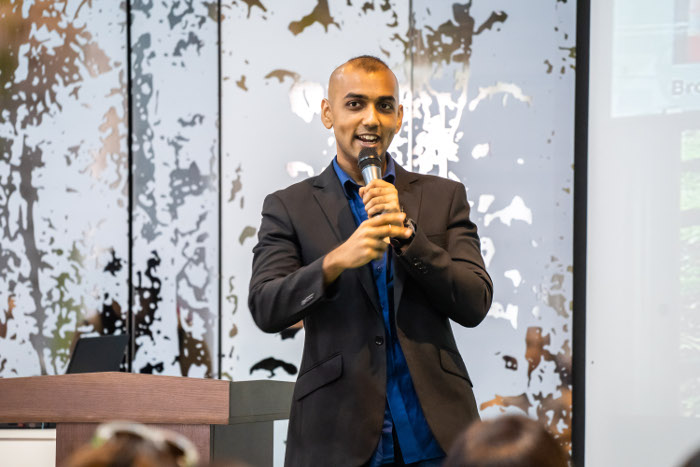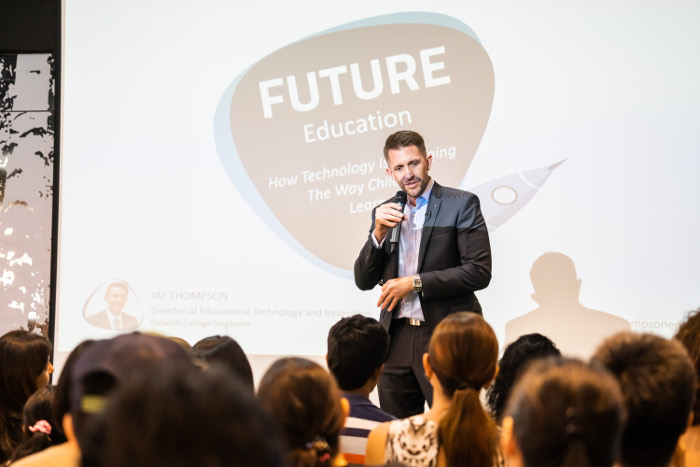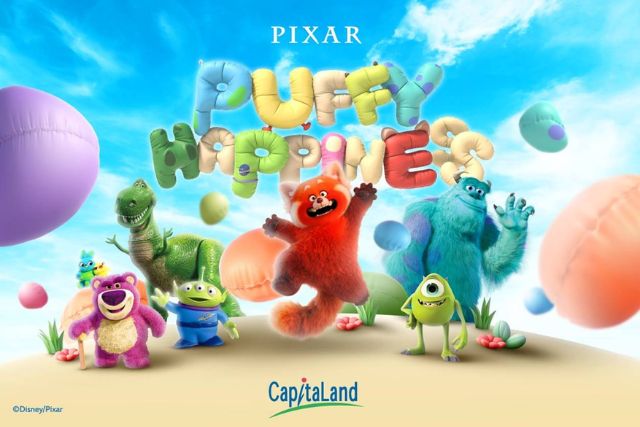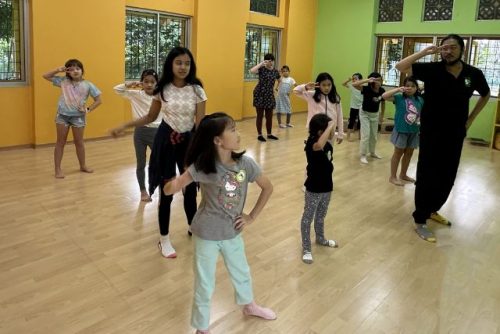What skills do children need to build in order to flourish in a tech-driven world? Will technology ever take over our jobs one day?
We asked two industry experts to share their insights with us.
 Abhilash Murthy, Founder of Bus Uncle, one of Singapore’s pioneer AI chatbot companies speaking at the British Council’s first parenting seminar, Raising the Future: The Tech Generation.
Abhilash Murthy, Founder of Bus Uncle, one of Singapore’s pioneer AI chatbot companies speaking at the British Council’s first parenting seminar, Raising the Future: The Tech Generation.
Will Artificial Intelligence take over our jobs? What are jobs today that can be easily overtaken by an A.I.?
Murthy: I don’t believe that AI will take over our children’s future job opportunities. Rather, it will create different types of jobs.
For example, a lot of companies have made Customer Service automated, but as a result, had to hire more copywriters to write the copy for the AI machine. We should be excited about the future; we’re not looking at a world with fewer jobs, but different jobs.
Tell us more about your background and why you decided to create Bus Uncle?
Murthy: When I was growing up, cartoons made me creative, video games made me logical, and metal music made me analytical, which all added up to an interest in coding. I wanted to build stuff. This led to me pursuing studies in Information Systems, and before starting Bus Uncle, I worked in data, engineering and web-based roles.
The inspiration behind Bus Uncle came from standing at a bus stop thinking ‘how long do I have to wait for the bus?’ So I went home and created Bus Uncle. It launched in late 2016 and today has over 160,000 users. It was all down to the basic action of spotting a need and coming up with a solution to serve that need.
What’s a chatbot, and what does it do?
Murthy: A chatbot is an artificial intelligence (AI) program that simulates interactive human conversation by using pre-calculated user phrases or text-based signals.
Chatbots are often used in situations in which simple interactions with only a limited range of responses are needed, for example customer service or marketing applications, where the chatbot can provide answers to questions on topics such as products, services or company policies.
In the case of Bus Uncle, the Facebook-based app works by users logging onto Facebook and liking the Bus Uncle page, then simply messaging Bus Uncle for bus timings. People love it as there’s no pressure in talking to a chatbot and it feels like a real person. Personality and participation are key in its appeal.
What are the skills necessary to flourish in the tech industry?
Murthy: Creativity. Because robots and machines cannot be creative, this is the one thing that robots cannot replace humans in simply because they lack the human ability to be creative.
Being observant. Everything is turning into a pluggable service. If a child has figured out an easier way of doing something, they’re on the way to success. It’s all about services coming together and new services being born out of that.
Being collaborative. Globalisation means everyone will be working together across the world, and most of the tech industry runs on teamwork. We should encourage children to increase their communication skills and learn the value of teamwork.
What’s a common misconception that most people have about the tech industry?
Murthy: One common misconception about the tech industry is that children should only learn coding with the view to later pursuing a career in software or web development. While these careers are possible, I strongly believe that coding teaches children that anything is possible.
➡️ Related Read: Best Coding Classes in Singapore
After I took it up, I came round to the thinking that there are no boundaries because they disappear in your head. Coders think everything and anything is possible, which can never be a bad thing when it comes to children’s growth and development.
 Jay Thompson, Director of Educational Technology and Innovation, Dulwich College (Singapore) speaking at the British Council’s first parenting seminar, Raising the Future: The Tech Generation.
Jay Thompson, Director of Educational Technology and Innovation, Dulwich College (Singapore) speaking at the British Council’s first parenting seminar, Raising the Future: The Tech Generation.
What are the top 3 skills you believe that today’s children need in order to flourish in a tech-driven world?
Thompson: As old industries disappear due to technological changes, a predicted 800 million jobs will be lost to automation by 2030. This means that it is now more important than ever to focus on skills rather than knowledge retention.
We need to be questioning whether schools should be all about grades and memorising or developing critical 21st century skills for the future workforce.
My top three skills necessary to flourish in a tech-driven world are:
Creativity. As children get older, we often see a decline in their creativity. However, in an environment where we’re moving away from traditional roles, we need young people to be more creative than ever. This not only includes creativity within the workforce but also looking for opportunities to create their own businesses and employment.
Critical Thinking. In the past information was a commodity reserved for intellectuals and specialists, many of whom dedicated their lives to becoming experts in their fields. Now information is freely available to everyone and requires the ability to sort and distill fact from fiction, locate relevant data and understand how to apply it to certain situations.
Collaboration. Utilising technology, we’re increasingly seeing opportunities for students to be able to connect with mentors and peers both nationally and internationally. These collaborative platforms provide a safe environment to share ideas and problem-solve together.
It’s great to see students connecting with schools in another country. It can be awkward at the beginning, but when they come out of it, the communication skills they’ve learnt are great – they can go out into the workforce feeling confident.
How can parents nurture these skills at home and in school?
Thompson: We have to understand that formal education has an end outcome, for example, exam results lead to getting into university, and this is not going to change in the near future. As parents, we can ensure that formal education is properly balanced with soft skills like sports and music, without the pressure of grades.
Let’s play music because it’s enjoyable, not because it’s about being competitive or being the best. Step away from just gaining knowledge, and do an activity because it’s an emotionally rewarding; move towards improving yourself as a person.
On top of receiving a formal education in Singapore, what other forms of ‘education’ do you believe every child needs to excel in the future?
Thompson: We don’t just want children’s education to happen during school hours, we want young people using technology to access their learning anytime and anywhere.
We want them to do micro-courses in coding which they can then apply to sections of mathematics, or use technology to access new learning tools on the bus, or on the way to soccer training. Learning should be effortless and happening naturally, driven by excitement and interest.
What are some of the jobs that exist today, but didn’t exist 5 years ago?
Thompson: According to the World Economic Forum, emerging jobs that exist today and are expected to hit 133 million by 2022 include:
- Data Analysts and Scientists
- AI and Machine Learning Specialists
- General and Operations Managers
- Software and Applications Developers and Analysts
- Sales and Marketing Professionals
- Big Data Specialists
- Digital Transformation Specialists
- New Technology Specialists
- Organisational Development Specialists
- Information Technology Services
In addition to the three skills mentioned earlier (creativity, critical thinking and collaboration), all of the roles above will require complex problem solving, emotional intelligence and judgment and decision making.
Declining roles might include data entry, administrative and assembly and factory workers, as they are most vulnerable due to automation; however many new jobs will be created because of the exciting technological advancements.
Abhilash Murthy and Jay Thompson recently spoke on children and technology at the British Council’s first parenting seminar, Raising the Future: The Tech Generation.
The seminar brought together thought leaders in the early childhood space to discuss the part that technology plays in children’s worlds and how to make the best of it. The British Council is the UK’s international organisation for cultural relations and educational opportunities.
* * * * *
Enjoyed reading this or learned something new? Click the Like and Share button below!
Want to be heard 👂 and seen 👀 by over 100,000 parents in Singapore? We can help! Leave your contact here and we’ll be in touch.




























































Leave a Comment: